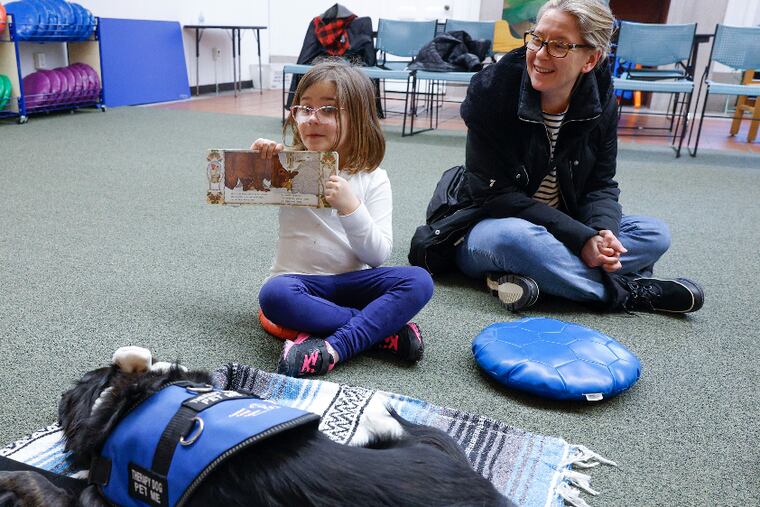Therapy dogs are helping kids become better readers at the Free Library
Every Wednesday afternoon at the Free Library's Parkway Central branch, kids are "tripping over themselves" to read to Cene, a 6-year-old therapy dog who likes books, head pats, and naps.

“Once there was a boy named Nicki, who wanted mittens as white as snow,” declared 6-year-old Vivienne Estabrook, reading the opening line of The Mitten, a classic children’s book, while sitting cross-legged on a purple carpet square at the Free Library of Philadelphia’s Parkway Central Branch.
Vivienne’s audience of one immediately flopped sideways on the floor and bared her tummy for rubs. Vivienne was reading to Cene, a Great Pyrenees, boxer, Tibetan spaniel, and Treeing Walker coonhound mix, who — coincidentally — is 6 years old.
Vivienne is a regular at the Parkway Central branch’s weekly “Read to a Therapy Dog” program, where children line up every Wednesday afternoon for 10-minute time slots to practice reading aloud to an attentive pup. Most weeks, it’s Cene and her handler, Fred Wolfe, who dressed Cene in an oversized, vaguely wintry white bow and handed out trading cards with Cene’s glamour shots on a Wednesday earlier this month.
The Parkway Central branch’s program started in November 2022 after children’s librarian Liz Gardiner transferred from Point Breeze’s Queen Memorial Library, where therapy dogs were occasionally invited to calm children during story time.
Most participants are what Gardiner dubbed “emerging and struggling readers,” or children aged 6 to 10 who are working to develop fluency, confidence, and the motivation to read on their own. Research shows that reading regularly to a therapy dog can help children socially and emotionally, with one 2010 University of California-Davis study even finding significant improvements in the reading ability of third graders who read to a therapy dog consistently over a 10-week period.
“Dogs aren’t judgmental. They’re not going to say ‘you’re taking too long to read this sentence’ or ‘you pronounced this wrong,’” explained Rasheem Clinton, the library assistant at the Parkway Central branch who took over the program from Gardiner when she changed branches in November. “That helps the kids feel comfortable going at their own pace and encourages them to become stronger readers.”
Vivienne likes reading to Cene because she’s “nice and a good friend,” but her mother, Katie Lane, has seen changes in her daughter’s reading habits since they began attending regularly in spring 2023.
“The dog is motivating her to practice,” said Lane. “It’s a safe place.”
» READ MORE: ‘The dog doesn’t care if you mess up some words’: Why Philly kids are reading to pooches
Canines and chapter books build confidence
Therapy dog reading programs have been a fixture at libraries and elementary schools since 1999, when Utah’s Intermountain Therapy Animals began offering literacy-specific training programs for therapy dogs and their handlers. Now, sessions are popping up at libraries in South Jersey and Bucks County, while other Free Library branches have cycled through offering the program, depending on budget constraints.
Philadelphia’s library system has been beleaguered with staffing and funding issues that caused branches to stop offering weekend hours until recently.
» READ MORE: Philly libraries will, at long last, be open on Saturdays
In Parkway Central’s case, the children’s department is able to offer “Read to a Therapy Dog” sessions weekly only because it partnered with Comfort Caring Canines, a Philadelphia nonprofit that provides therapy dogs to libraries and hospitals (among other places) free of charge. Wolfe — Cene’s owner — just happens to be the president.
Wolfe began volunteering with Cene to “keep her in practice.” Bred to be a therapy dog, Cene is mild-mannered and partial to head pats, often falling asleep on kids’ laps as they reach a story’s climax. That’s because “she loves the sound of children’s voices,” said Wolfe, not because she is a lazy girl.
Cene “can sense that she can be helpful,” said Wolfe. “Her tail is always wagging when she reaches the top of the steps at the [Parkway] Central branch.”
Kids are “tripping over themselves to read to Cene,” said Clinton.
Ramona, who is soon to be 7, comes to read to Cene with her 9-year-old brother, Desmond, regularly. “She’ll stay and listen to you,” said Ramona, who wasn’t the least bit bummed that Cene fell asleep while she read a book about a dog that goes camping.
Ramona and Desmond’s mother, Erin Rooney, said that hanging with Cene has helped Ramona “see herself as a reader for the first time” and Desmond become more expressive. Ramona had never read aloud to an audience until she met Cene, said Rooney, while Desmond has started doing different character voices and sound effects while working through his chapter books.
Rooney’s kids, of course, are also using the experience to push for a puppy of their own.
“I want a dog that’s kind of like Cene,” said Desmond. “Likes to play but doesn’t have a ton of energy, so she’ll just want to lay down mostly.”